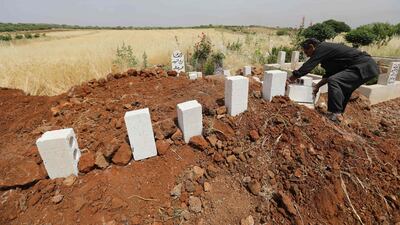It was one of the Syrian conflict’s shorter-lived ceasefires. Within hours of an announcement by Turkey and Russia that they had brokered a deal to halt in the fighting in Idlib, Syrian government forces had resumed shelling rebel areas and a Turkish observation post. The tentative hopes of long-suffering civilians were dashed once again.
The fighting in Idlib, which resumed over the last two months, threatens a massive humanitarian catastrophe. Around 3 million people, many of them displaced from other parts of the country, live in Syria's last rebel-held province, which is ruled primarily by militants once affiliated with Al Qaeda. Bombarded by the brutal regime of Bashar Al Assad from the outside and tormented by religious extremists from within, tens of thousands have fled to the Turkish border, and hundreds have already been killed.
Moscow, the Assad regime’s main backer, and Ankara, which enjoys widespread influence among the opposition, had apparently hoped to buy some time ahead of a destructive regime campaign to reclaim Idlib.
The failure of the ceasefire, and the ensuing tit-for-tat shelling between Turkish forces and Syrian government troops, have highlighted the intractability and sensitivity of the Syrian war’s endgame. It also underscores the fact that even the vaguest contours of a solution remain elusive, despite the regime’s military victories.
First, the Assad regime exists in a bizarre dichotomy, where it enjoys impunity in the way it chooses to prosecute this long and grinding war, but also lacks the basic trappings of a sovereign nation state. Russia, which has acted as the regime’s enforcer and sole purveyor of legitimacy on the international stage, negotiated a ceasefire deal without even involving Syria, as it has done in other parts of the country. The regime, which picks and chooses whether to adhere to the agreements of its patron, decided simply that it was not bound by this particular deal. It is an arrangement that gives the Russians plausible deniability when it comes to Assad’s war crimes, and allows his regime to do what it wants.
The reality is that the Assad regime cannot be trusted to enforce any deal to halt the fighting, let alone a broader political solution that actually grapples with the roots of the Syrian conflict. Its behavior in Idlib has parallels to its routine detention and torture of refugees who decided to return to the country, despite assurances that they would not be persecuted.
It is clear that those who want to negotiate with the regime and extract some nebulous concessions in exchange for peace are deluding themselves that it intends on any level to adhere to agreements that diminish its power over Syrians.
The second element that the fighting highlighted is the international dimension, which complicates any attempt at finding even short-term solutions. Even if Turkey and Russia are able to come to the negotiating table to work out a deal, such an agreement may not be acceptable to Iran or the US – both of whom maintain forces in Syria – or, indeed, to the regime itself, which has proven adept at playing its allies against each other.
The reality is that international actors have almost perfected their ability to fight for diametrically opposed goals and agendas inside Syria, without significant clashes that risk a broader regional war. The skirmishes between the Syrian government and Turkish forces are unlikely to develop beyond that, with Syria’s foreign minister declaring that the regime does not intend to do battle with Ankara. The firepower will instead be directed at hospitals and civilians in the rest of Idlib, once again guaranteeing that only Syrian civilians pay the price for the sins of the foreign powers that pretend to be their friends.
Finally, we are no closer to a solution that, at the very least, ends the fighting in Syria. If the regime proceeds with its planned military offensive, a course that it appears set on pursuing for the time being, a bloodbath and the worst humanitarian disaster of the war will follow.
But the status quo is also awful. Nearly 3 million people are living a destitute existence that could be shattered at any moment by warplanes, artillery or poison gas. They have nowhere else to go and are condemned to live under the totalitarianism of Hayat Tahrir Al Sham militants, who rule by force of arms, or the secular totalitarianism of the Assad regime across the frontlines.
There is no clear way out of this morass. The international community is exhausted by Syria, and has delegated peacemaking to regional and global powers, who are determined to act in their own perceived national security interests.
What Idlib has shown us with the on-again, off-again ceasefire is that Syrians will have no say in how the conflict is resolved, but will always be made to pay the price for it.


